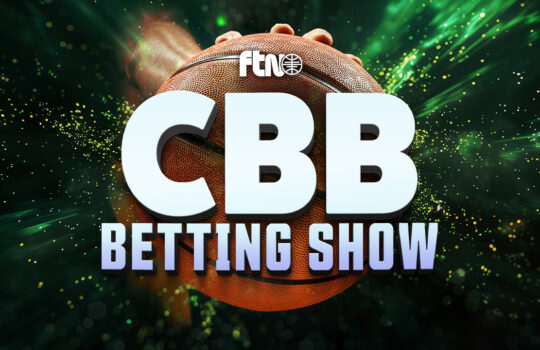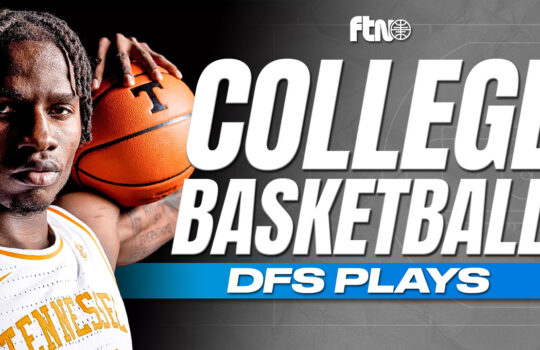
Dwight Schrute said it best: “Keep it simple stupid.” That isn’t just great advice. It’s a mantra for fantasy football drafts. Instead of developing an overly elaborate plan for your drafts, keeping things as a simple as possible is other the path to success. On draft day, overthinking is the enemy. Instead, the goal is to react to what the board is giving us and make our opponents pay for their mistakes.
This is easy advice to give, but it’s very difficult to execute. You’ll need to get your prep work done beforehand. You don’t want to be the kid in school who shows up on the day of the exam having not studied. We all have that guy in our drafts. Don’t be that guy.
We have you covered here at FTN with our Draft Kit content. With a Fantasy+ subscription, you get access to the 2023 Game Plan Draft Guide, our fantasy football draft cheat sheets, our rankings tool and fantasy football projections, and much more. Use promo code “Ratpack” for a discount on your subscription.
In addition to all that great information, I’m going to share with you something I started several years ago that made me a much better drafter. In-person drafts can take a long time. They’re chaotic, and sometimes the adult beverages may be flowing. Unfortunately, it’s easy to lose track of your goals in the heat of the moment. To stay on track during my drafts, I started bringing a checklist with me on draft day that listed the goals I had in each draft. Now you can do the same thing. Here are the 10 things I want to accomplish on fantasy football draft day.
1. Don’t lock into positions before your draft begins.
One of the biggest mistakes I see drafters make is locking themselves into positions early in drafts. You probably know the drill. “In the first round I’m going to take a running back. Then I’m going wideout in Round 2 and back to running back in the third.” Don’t get me wrong. I love that we’re creating a draft plan, but we’re focusing on the wrong details here.
This mindset is completely dedicated to what we’re doing with our picks, but it’s overlooking what our opponents are doing. Our opponents are going to make mistakes in fantasy football drafts. Typically, this means letting value slide down the board. Let’s say you’re up in the second round. You came in saying you’re drafting a running back here, but your opponents have left a wide receiver on the board who just shouldn’t be there. Are you going to pass up this value and stick to your plan? Heck no. Take the value and make them pay for their mistake.
Remember, this approach is only for the early rounds. Once you get into the middle rounds, you’ll have to adjust based on your roster construction. But in the early rounds, don’t lock into positions for each round. It’s a mistake that the savvy opponents in your league will exploit.
2. Minimize risk in the first three rounds.
In the early rounds of drafts, it’s also very important to minimize your risk. The first three-to-five rounds of your draft will form the core of your roster. That’s not to say that you can’t have success if you miss on these picks, but you’re really making things difficult for yourself. To be fair, it’s impossible to eliminate risk. Players are going to get hurt in football. That’s the nature of the game, but we can at least prioritize players who come with the least volatility in our first three picks.
3. Draft one (and only one) top-8 fantasy football running back in the first two rounds.
With running back seemingly as thin as it’s ever been, it’s a good idea to anchor your roster with one top-8 option. In recent seasons, you likely had to use your first-round pick on the position. However, you’ll almost certainly have a crack at a top-8 options in the second round given this year’s trends.
This goal very much syncs up with our previous goal of minimizing risk. By taking a top-8 back, you put yourself on solid footing at the position. From here, you can punt your second running back spot and not address the position again until the middle rounds. While you may not walk out of your draft “loaded” at running back, the stable of wideouts you’ll be able to put together in the early rounds will be formidable. Better yet, with this approach, you aren’t heavily investing your valuable early-round picks in the most fragile fantasy asset.
4. Draft three running backs between Rounds 7 and 10.
To successfully punt your second running back spot, you’ll need to address the position in the middle rounds. Running back dries up very quickly in 2023 fantasy football drafts. Current ADP data says that at least 40 running backs will be off the board by the end of the ninth round. Even at that point, we’re looking at handcuffs and questionable committee backs. And it only gets worse from there. If you wait any longer at running back, you aren’t going to like the results. So be sure to make the position a priority in this range of your drafts.
5. Prioritize high-ceiling wide receivers and running backs in the middle and late rounds.
Safe may work well in the early rounds, but safe doesn’t create championship-caliber rosters in the middle- and late-rounds. In this phase of your drafts, go after players with the highest possible ceilings at wide receiver and running back. The key here is that we want to risk it for the biscuit. Safe picks in the middle rounds typically lead to rosters that safely finish in fourth place. If you want to take down your league, grip it and rip it in the middle rounds. Of course, you likely won’t hit on every pick in this range, but you’re going to miss 100% of the shots you don’t take.
6. Get a top-7 tight end, but not a top-3 tight end.
The temptation to draft an elite tight end is very real in the first two rounds of this year’s drafts. But do you really need Travis Kelce or Mark Andrews to win your league? Sure, having the weekly advantage that they offer is a nice perk, but it’s often far more advantageous to have a lot of depth at running back and wide receiver. Unlike tight end, where you’re only required to start one player in regular leagues, you’re often starting upwards of three running backs and four wideouts in leagues with a flex. High-end depth is much more crucial at those positions. And the beauty to tight end is that you can often find high ceiling options in the middle and late rounds.
This year, the wheelhouse seems to be between Rounds 5-7. You’ll likely see just three tight ends drafted by this range of drafts, so it’s a great time to pounce on a high ceiling option at a discount. George Kittle, Kyle Pitts, Darren Waller, and Dallas Goedert all fit the bill. Sure, they aren’t as safe as Andrews or Kelce, but there’s a lot more bang for your buck in the middle rounds.
7. Draft a high-ceiling option as your second tight end.
You don’t have to roster a second tight end, but it’s a good idea to shoot for upside if you’re going to roster two. Since you don’t have an elite option as your first tight end, you might as well swing for the fences with your second pick. In recent seasons we’ve seen late-round tight ends pay dividends. Two seasons ago, Dalton Schultz put up a massive season after being a late-round option. Last year, it was Evan Engram This year’s late-round options include Dalton Kincaid, Chigoziem Okonkwo, and Cole Kmet.
8. Fade the top-10 fantasy quarterbacks unless you’re getting three rounds of value in 1QB leagues.
You don’t need Patrick Mahomes, Jalen Hurts, or Josh Allen to win your leagues. Seriously. You’re going to have plenty of options at your disposal in the late rounds, and that’s even true if you’re in one of those home leagues that goes quarterback-crazy in the early rounds. Even those leagues, people eventually stop drafting quarterbacks and you’ll have your pick of the litter in the late rounds. In 1QB leagues, you don’t need to draft a quarterback until after Round 10. Here, I recommend the “safe-and-upside” approach that I outline below in the next section.
However, with the early round quarterbacks, drafting them at value can result in an unbalanced roster build at your other positions. That’s why I won’t draft them unless I’m getting three rounds of value on my player draft grade. In our fantasy football draft cheat sheets you’ll find my draft board. Here I have every player listed on a board with round grades. So, if a quarterback has a third-round grade, he would need to still be around in the 6th round in order to draft him. Sure, that isn’t likely to happen, but the idea is that we’re loading up at our non-QB spots in the early rounds since we have to start more of them. This gives us a competitive advantage on our opponents.
“But Jeff, you don’t get it, man. Quarterbacks score a lot of points in my league.” Sure, I bet they do. But that doesn’t change the fact that there are roughly 20 quarterbacks who can be in the mix as viable starting options heading into this season. Use that value to your advantage.
9. If you don’t get value on a top-10 quarterback, draft one safe and one upside quarterback in the late rounds.
It’s unlikely that you’re going to find value on a top-10 quarterback in your home leagues, so this is where we go with the “safe-and-upside” approach. The goal here is simple: we draft one safe quarterback and one upside quarterback in the late rounds.
Drafting the safe option will give us a viable starter as we head into the season, and we can then swing for the fences with the upside option. If we miss on him, we at least have out safe option, and we can potentially work the wire from there. This approach has worked wonders over the years and has recently yielded Lamar Jackson and Patrick Mahomes. This year’s safe options include Kirk Cousins, Geno Smith, Aaron Rodgers, Jared Goff, and Derek Carr. For upside, we’re looking at Anthony Richardson, Daniel Jones, Russell Wilson, and Tua Tagovailoa. Kyler Murray would also classify if we get wind that he’ll be back on the field relatively early in the season.
10. Only draft a defense and/or kicker if you’re required by your league to do so.
If you’re in a league that starts a defense and/or kicker, make sure you know if you’re required to draft them. Some leagues require you, and that’s fine. Don’t worry about this goal. But if you aren’t required to, then don’t. Use those two picks to draft for upside at the skill positions. Sure, you’re ultimately going to have to cut two players in order to fill those starting defense and kicker spots, but you can use that extra time to your advantage with the two extra players you drafted. This move gives you more options at your disposal than anyone in your league who drafted a defense and a kicker.
Accomplish every item on the list and you’re going to be very happy with your roster. It’s important to not get lost in the shuffle during your draft, so keep your checklist close by and refer to it when you make each of your picks. Don’t forget that it isn’t about just your team in a draft. You’re playing against your opponents so make them pay for their mistakes. And above all, keep it simple stupid.


























































